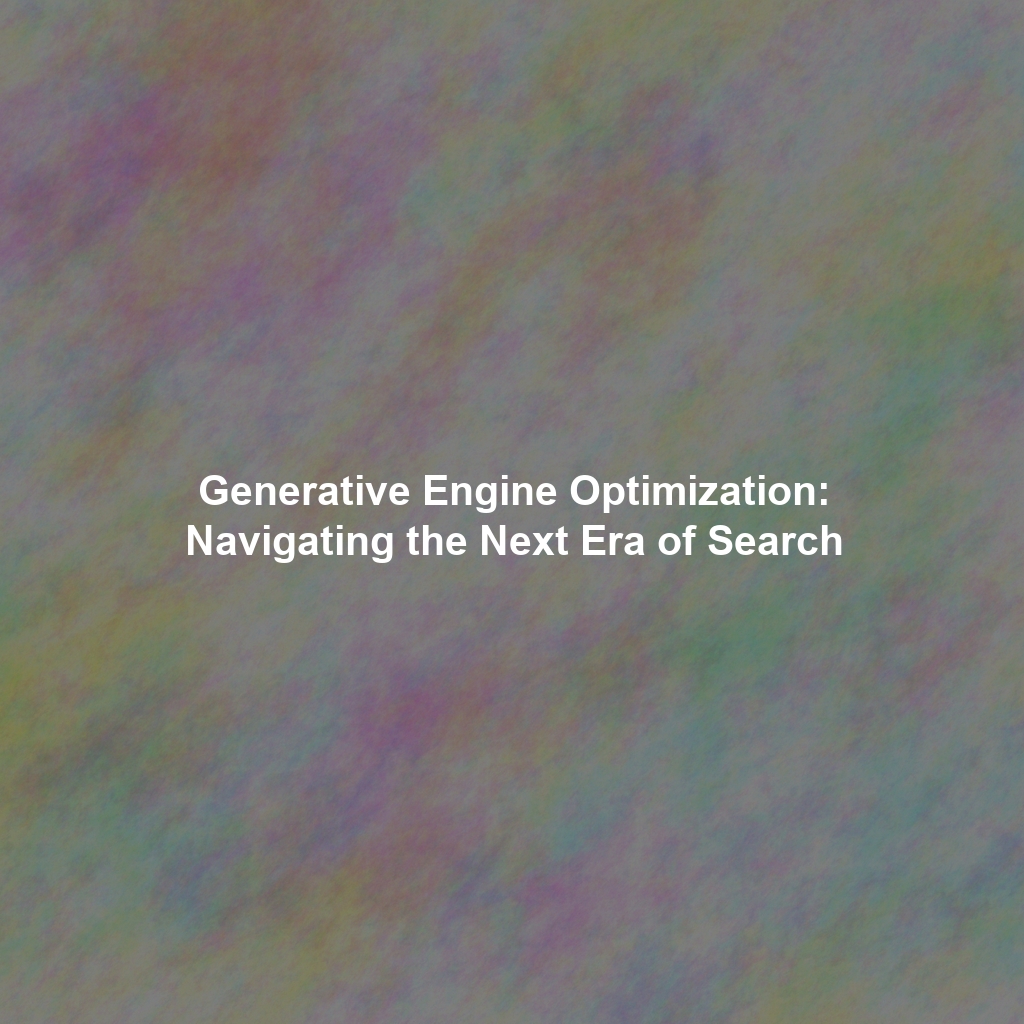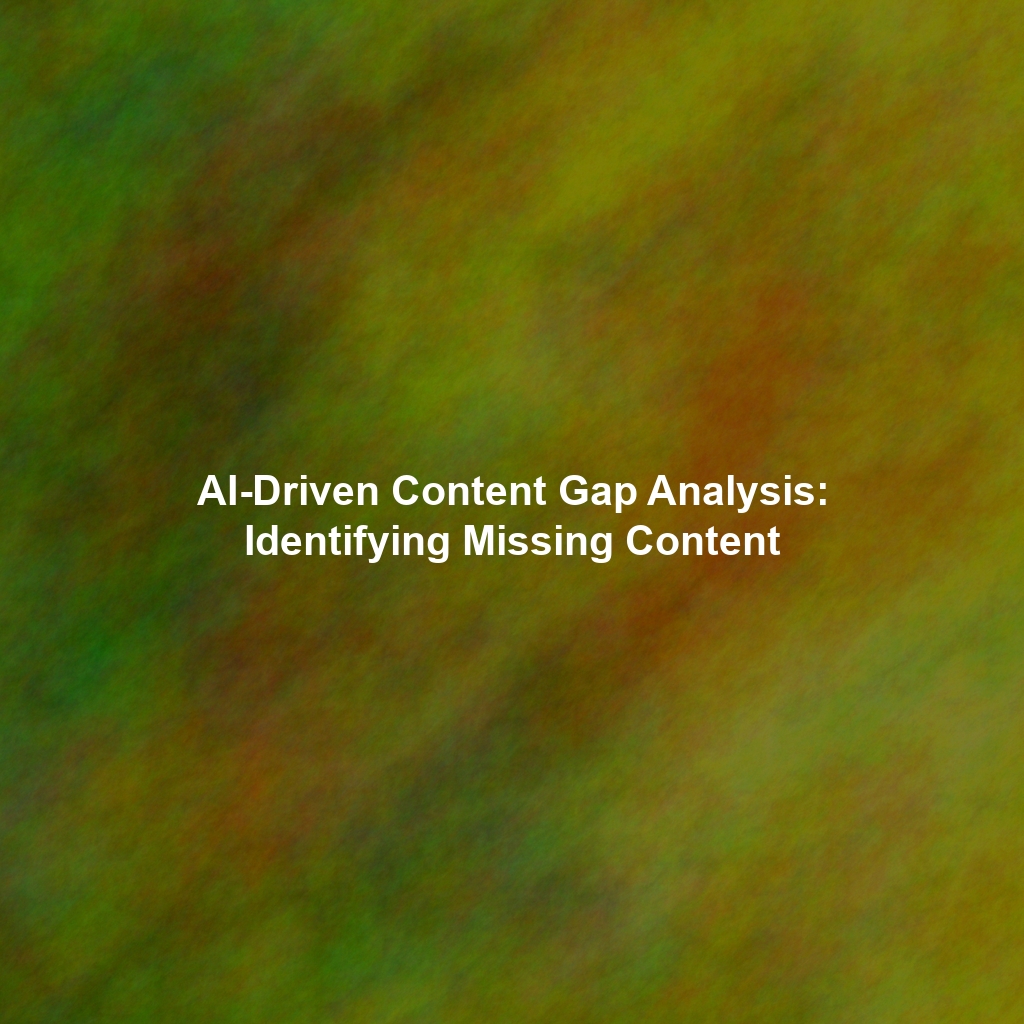Generative Engine Optimization: Navigating the Next Era of Search
The world of Search Engine Optimization (SEO) is perpetually evolving. From keyword stuffing to sophisticated algorithms, the landscape has dramatically shifted over the years. Now, we stand on the precipice of another significant transformation: Generative Engine Optimization (GEO). This emerging field, driven by advancements in artificial intelligence (AI) and natural language processing (NLP), promises to redefine how we understand, optimize for, and interact with search engines. For SEO professionals, marketers, and anyone invested in digital visibility, understanding GEO is no longer optional—it’s crucial for future success.
Understanding Generative AI and Its Impact on Search
At the heart of GEO lies generative AI. Unlike traditional AI that analyzes and classifies existing data, generative AI models, like large language models (LLMs) such as Google’s LaMDA or OpenAI’s GPT, are capable of creating entirely new content. This includes text, images, code, and more. In the context of search, these models are being integrated to understand search intent more deeply, generate more relevant and comprehensive search results, and even create entirely new forms of user interaction.
The Evolution of Search: From Keywords to Context
For decades, SEO focused primarily on keywords. Optimizing content around specific search terms was the cornerstone of ranking. However, search engines have grown far more sophisticated. They now prioritize context, user intent, and the overall quality of the information provided. Generative AI is accelerating this trend. Search engines can now understand the nuances of language, identify the underlying motivations behind a search query, and deliver results that directly address the user’s needs, even if the exact keywords aren’t present.
Key Generative AI Technologies Shaping SEO
Several key AI technologies are driving the GEO revolution:
- Large Language Models (LLMs): These models power the ability to understand and generate human-like text. They are used for everything from understanding search queries to creating compelling content.
- Natural Language Processing (NLP): NLP algorithms analyze the structure and meaning of language, enabling search engines to interpret user intent and extract relevant information from vast amounts of data.
- Machine Learning (ML): ML models learn from data and improve their performance over time, allowing search engines to continuously refine their understanding of search queries and user behavior.
- Generative Adversarial Networks (GANs): While less directly involved in core search functionality, GANs can be used to create realistic images and other media, which can enhance content and improve user engagement.
The Core Principles of Generative Engine Optimization
GEO is not simply about adding AI to existing SEO practices. It requires a fundamental shift in perspective. Here are the core principles:
Focus on User Intent, Not Just Keywords
Instead of obsessing over specific keywords, focus on understanding what users are *actually* looking for. What questions are they trying to answer? What problems are they trying to solve? Create content that directly addresses these needs, providing comprehensive, accurate, and engaging information. Keyword research is still valuable, but it should be used to inform your understanding of intent, not dictate your content strategy. Consider using tools like Google’s Keyword Planner and SEMrush to understand search intent.
Prioritize High-Quality, Authoritative Content
Generative AI thrives on high-quality data. Search engines are increasingly prioritizing content that is well-written, accurate, and authoritative. This means providing original research, citing credible sources, and demonstrating expertise in your field. E-E-A-T (Experience, Expertise, Authoritativeness, and Trustworthiness) remains paramount. Build a strong reputation and establish yourself as a thought leader in your niche. This can be achieved through guest blogging, publishing original research, and active participation in online communities. See Google’s Search Quality Evaluator Guidelines for more insights.
Optimize for Conversational Search
Voice search and conversational interfaces are becoming increasingly popular. Optimize your content for natural language queries. This means thinking about how people actually speak and ask questions, not just the keywords they might type. Use structured data markup to help search engines understand the context of your content and provide relevant answers to voice search queries. Leverage tools like AnswerThePublic to understand the questions people are asking.
Embrace Content Versatility and Multimedia
Generative AI can create various content formats, from text and images to videos and interactive experiences. Leverage this versatility to engage users in new and exciting ways. Experiment with different content formats to see what resonates best with your audience. Consider using tools like Canva to create visually appealing content. Ensure your content is accessible and optimized for various devices.
Practical GEO Strategies for SEO Professionals
Implementing GEO requires a proactive and adaptable approach. Here are some practical strategies:
Content Creation with Generative AI
Generative AI can be a powerful tool for content creation. Use LLMs to brainstorm content ideas, generate outlines, and even draft initial versions of articles. However, remember that AI-generated content should always be reviewed and edited by a human expert. Ensure the content is accurate, original, and aligned with your brand voice. Tools like Jasper.ai or Copy.ai can assist in content creation but should not replace human oversight.
Enhancing Existing Content with AI
Use AI to analyze your existing content and identify areas for improvement. AI can help you identify opportunities to add more detail, address user intent more effectively, and optimize your content for specific keywords. Consider using AI-powered tools to rewrite or summarize existing content to provide different perspectives.
Optimizing for Featured Snippets and Rich Results
Generative AI is heavily involved in determining which content appears in featured snippets and rich results. Optimize your content for these highly visible search features by providing clear, concise answers to common questions. Use structured data markup to help search engines understand the context of your content. Research what questions users are asking related to your niche. See Google’s documentation on structured data.
Monitoring and Analyzing Performance
Use SEO analytics tools to track your performance and identify trends. Monitor your keyword rankings, organic traffic, and user engagement metrics. Analyze the search queries that are driving traffic to your site and identify opportunities to optimize your content. Utilize Google Analytics and Google Search Console to track performance.
The Future of Search and GEO: Trends and Predictions
The future of search is inextricably linked to the evolution of generative AI. Here are some key trends and predictions:
The Rise of Conversational Search and AI-Powered Assistants
Voice search and AI-powered assistants like Google Assistant and Amazon Alexa will continue to grow in popularity. Optimizing for conversational search will become even more critical. Expect to see more sophisticated AI-powered assistants that can understand complex queries and provide personalized recommendations.
The Integration of AI into Search Interfaces
Search engine interfaces will become more interactive and engaging. Expect to see AI-powered features that allow users to ask follow-up questions, refine their search queries, and explore information in new and innovative ways. AI will play a crucial role in personalizing search results and delivering a more tailored user experience.
The Importance of Data Privacy and Transparency
As AI becomes more integrated into search, data privacy and transparency will become increasingly important. Search engines will need to be transparent about how they collect and use user data. Users will demand greater control over their data and expect more privacy protections. GDPR and CCPA are setting the stage for this.
The Evolving Role of the SEO Professional
The role of the SEO professional will evolve. SEOs will need to become more skilled in data analysis, content strategy, and AI-powered tools. They will need to understand the nuances of user intent and be able to create content that directly addresses user needs. A deep understanding of how AI models work will be increasingly valuable. Continuous learning and adaptation will be essential for success.
Conclusion: Embracing the Generative Engine Optimization Revolution
Generative Engine Optimization represents a fundamental shift in the way we approach SEO. By understanding the principles of GEO and embracing the power of generative AI, SEO professionals and marketers can position themselves for success in the future of search. This is not just about adapting to new technologies; it’s about understanding the evolving needs of users and creating content that provides real value. The journey into GEO requires a commitment to continuous learning, a willingness to experiment, and a focus on creating high-quality, authoritative content that resonates with your target audience. The future of SEO is here, and it’s powered by generative AI. It’s time to embrace the change and start optimizing.
 Skip to content
Skip to content

